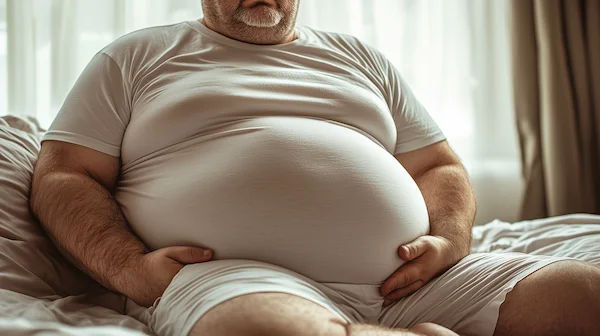Guide to impact Of Obesity And Mental Health
Explore the complex link between obesity and mental health. Understand how they influence each other, and learn about strategies for a holistic approach to managing both physical and psychological well-being.


Introduction
The connection between our physical and mental well-being is profound and undeniable. Often viewed as separate health issues, obesity and mental health are, in reality, deeply intertwined in a complex, self-perpetuating cycle. Struggling with your weight can take a significant toll on your emotional state, while conditions like depression and anxiety can make healthy habits feel impossible. This isn't about a lack of willpower; it's about biology, psychology, and sociology working together. This article will guide you through the science behind this bidirectional relationship, explore the specific mental health conditions involved, and, most importantly, provide actionable strategies to break the cycle and foster holistic wellness for both your body and mind.
Understanding the Two-Way Street: Obesity and Your Mind
The relationship between obesity and mental health is best described as a bidirectional highway—traffic flows powerfully in both directions. One doesn't simply cause the other; they influence and exacerbate each other, creating a feedback loop that can be difficult to escape. Understanding this mechanism is the first step toward healing.
How Mental Health Challenges Can Lead to Weight Gain?
Mental health disorders can create a perfect storm of factors that promote weight gain.
Depression and Emotional Eating
Depression often saps energy and motivation, making physical activity feel daunting. It can also lead to emotional eating, where food (particularly high-carb, high-fat "comfort foods") is used to self-medicate and temporarily boost serotonin levels. This creates a short-term relief but long-term weight gain, which can then deepen feelings of depression.
Anxiety and Stress-Induced Cravings
When we're anxious or stressed, our bodies release the hormone cortisol. Chronically high cortisol levels increase appetite and drive cravings for sugary and fatty foods, priming the body to store fat, especially around the abdomen. This is a primal survival mechanism, but in our modern world, it contributes significantly to weight-related issues.
Consult Top Specialists
The Role of Medications
It's a challenging reality that some common psychiatric medications, such as certain antidepressants and antipsychotics, can cause weight gain as a side effect. They can increase appetite, alter metabolism, or cause fatigue that reduces physical activity. This doesn't mean one should avoid these necessary treatments, but it highlights the need for a proactive management plan with a doctor.
How Obesity Can Affect Psychological Well-being
The impact of obesity on mental health is often fueled by external and internal factors.
The Weight of Social Stigma and Discrimination
Society often unfairly stigmatizes individuals with obesity, leading to discrimination in everything from healthcare settings to the workplace. This constant experience of bias, bullying, and negative stereotypes is profoundly damaging, leading to chronic stress, social isolation, and a significantly higher risk of developing depression and anxiety disorders.
Body Image Dissatisfaction and Low Self-Esteem
Living in a body that doesn't align with societal ideals or personal expectations can erode self-worth. Persistent negative body image is a key predictor of low self-esteem, which can discourage social participation and create a negative self-view that permeates all aspects of life.
Chronic Inflammation and The Brain
Emerging research points to a fascinating biological link. Obesity is a state of chronic, low-grade inflammation. These inflammatory markers don't just affect the body; they can cross the blood-brain barrier. This neuroinflammation is believed to contribute to the development of depression and anxiety by affecting brain regions responsible for mood regulation.
Specific Mental Health Conditions Linked to Obesity
While the relationship is broad, several conditions have a particularly strong link to obesity.
Depression and Obesity: A Common Pair
The correlation is powerful. Studies show that people with obesity are about 25% more likely to experience a mood disorder like depression. The feelings of hopelessness and fatigue associated with depression can sabotage weight management efforts, while the physical discomfort and stigma of obesity can deepen depressive symptoms.
The Anxious Connection
Anxiety disorders and obesity also share a close bond. The constant state of worry and physiological arousal (high heart rate, cortisol) common in anxiety can disrupt sleep and promote unhealthy eating patterns. Conversely, the health worries and social anxiety related to one's weight can fuel generalized anxiety.
Binge Eating Disorder (BED): More Than Just Willpower
BED is the most common eating disorder in the United States and is characterized by recurrent episodes of eating large quantities of food, often rapidly and to the point of discomfort, accompanied by a feeling of loss of control. Unlike bulimia, these episodes are not followed by purging. BED is a serious mental health condition that requires specific therapeutic intervention, not just nutritional advice.
The Impact on Childhood and Adolescent Mental Health
This cycle can start early. Children with obesity are more likely to be bullied and develop low self-esteem, which sets the stage for anxiety and depression. These psychological causes of obesity in youth can lead to emotional eating, creating a lifelong pattern that is difficult to break without early intervention and family support.
Breaking the Cycle: Strategies for Integrated Management
The key to success is addressing both issues together, not in isolation. A singular focus on weight loss without addressing underlying mental health, or vice versa, is often ineffective.
Seeking Professional Help: A Combined Approach
The most critical step is to seek help from professionals who understand this link. This might involve a team: a primary care physician, a psychiatrist, a therapist, and a registered dietitian. If you recognize these patterns in yourself, consulting a doctor online with Apollo24|7 can be a great first step to create a coordinated care plan tailored to your unique needs.
Lifestyle Interventions: Diet, Exercise, and Sleep
Focus on health, not just weight.
Diet: Shift from restrictive dieting to a balanced, nutritious eating pattern that fuels both body and brain.
Exercise: Find physical activity you enjoy. The goal is mood enhancement and stress reduction first; weight loss is a beneficial side effect.
Sleep: Prioritize 7-9 hours of quality sleep. Poor sleep disrupts hunger hormones (ghrelin and leptin) and increases cortisol, making weight management harder.
Cognitive Behavioral Therapy (CBT) for Weight and Wellness
CBT is a gold-standard treatment for both depression and binge eating disorder. It helps individuals identify and change negative thought patterns and behaviors related to food, body image, and self-worth. It provides tools to manage stress and emotions without turning to food.
Mindfulness and Stress Reduction Techniques
Practices like meditation, deep breathing, and yoga can lower cortisol levels, improve emotional regulation, and reduce impulsive emotional eating. By becoming more aware of physical hunger cues versus emotional cravings, you can make more conscious food choices.
Conclusion
The intricate link between obesity and mental health reveals a clear truth: you cannot truly care for one without the other. This is not a simple problem with a simple solution, but understanding the cycle is the first step toward empowerment. By acknowledging the role of stress, emotions, biology, and society, we can move away from blame and toward compassionate, effective strategies. Breaking free requires a holistic plan that nurtures both your physical and psychological well-being. Remember, the goal is not perfection but progress—small, consistent steps toward a healthier mind and a healthier body. If you feel overwhelmed by this cycle, know that you don't have to navigate it alone. Reach out to a healthcare professional who can guide you on a path to integrated wellness.
Consult Top Specialists
Consult Top Specialists

Dr Aakash Andgi
General Physician/ Internal Medicine Specialist
9 Years • MBBS MD
Bengaluru
Apollo Clinic, JP nagar, Bengaluru

Dr Syed Mateen Pasha
General Physician
2 Years • MBBS
Bengaluru
PRESTIGE SHANTHINIKETAN - SOCIETY CLINIC, Bengaluru

Dr. Vivek D
General Physician
4 Years • MBBS
Bengaluru
PRESTIGE SHANTHINIKETAN - SOCIETY CLINIC, Bengaluru

Dr. Anand Ravi
General Physician
2 Years • MBBS
Bengaluru
PRESTIGE SHANTHINIKETAN - SOCIETY CLINIC, Bengaluru

Dr. Harshendra Jaiswal
General Physician/ Internal Medicine Specialist
12 Years • MBBS , MD (General medicine)
Kolkata
108 DHANA DHANVANTARI Clinic, Kolkata
(25+ Patients)
More articles from Obesity
Frequently Asked Questions
1. Can anxiety medication cause weight gain?
Yes, some medications used to treat anxiety, particularly certain SSRIs and antipsychotics, can have weight gain as a potential side effect. They can increase appetite or slow metabolism. It's important to discuss this with your psychiatrist, as not all medications have this effect, and the benefits often outweigh the risks. Management strategies can be put in place.
2. What are the signs of emotional eating?
Key signs include eating when you're not physically hungry, craving specific comfort foods (usually junk food) when stressed or sad, eating to the point of discomfort, and feeling guilt or shame after eating. It often feels impulsive and uncontrollable.
3. How can I talk to my doctor about my weight and mental health?
Be open and honest. You can start by saying, 'I'm struggling with my weight, and I believe my mood/stress levels are a big part of it,' or 'I've been feeling down, and I've noticed it's affecting my eating habits.' A good doctor will understand this connection and can help you develop a plan or refer you to a specialist like a therapist or dietitian. You can book a confidential online consultation with a doctor on Apollo24|7 to discuss this from the comfort of your home.
4. Does losing weight automatically improve mental health?
Not always. While losing weight can improve self-esteem and physical health, if the underlying psychological causes of obesity like depression or trauma are not addressed, mental health may not improve sustainably. Furthermore, the process of restrictive dieting can itself be stressful and damaging to one's relationship with food. An integrated approach is best.
5. What is the best type of therapy for binge eating?
Cognitive Behavioral Therapy (CBT) is considered the first-line, most evidence-based treatment for Binge Eating Disorder (BED). It specifically targets the thoughts and behaviors that maintain the binge cycle. Other effective modalities include Dialectical Behavior Therapy (DBT) and Interpersonal Psychotherapy (IPT)




